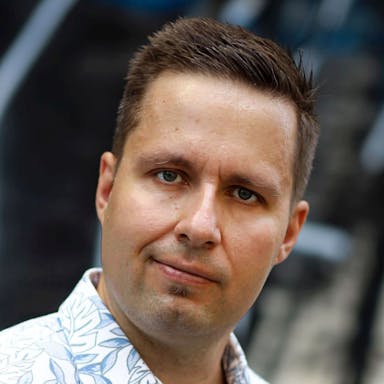
Martin Koníček
Blog
I would like to give up every week, and that's normal.

In the previous article, I talked about creating a vision, now I'll try to explain a bit how I proceed. I'll give my own example, I had an idea that I would learn web development, according to the latest standards, the latest technologies, and how it should be done, almost from scratch - three years ago it was twenty years since I had worked in PHP, and I didn't remember almost anything, since then the field has completely changed.
When I started to realize my vision, I knew that I was learning web development for myself - so the goal was not technologies that sell well somewhere in the company full time, and if there was any idea, it was rather freelance work and my own paths, but even better, completely my own projects.
The goal was also to reduce the amount of knowledge needed, so I immediately noticed Javascript, as a technology that can be used both on the server and in the browser, so-called full stack.
In the beginning, I only had very vague outlines, no mentor, and a vision. I started learning Javascript through Udemy in the evenings, just for the idea, I bought a course for 10 euros - I remember this for those who think that there are no opportunities.
During one year, I covered the basics of Javascript, I didn't rush. The second year, I thought I would like to push it a bit further, I was looking for a framework. Again, I wanted to choose a safe path, something proven and functional, so I bet on React. Still not even one web was realized, and not one tangible result, and already a year of daily work - just to get an idea of how difficult it is.
Here I would like to mention that I realize my visions in micro steps, I have an idea, and I consistently and persistently fulfill it. Maybe I'm slow, but I can really achieve those goals. During the second year, I mastered React.
So I moved on to the third year, and took on the task of creating something. As a framework, I chose Next.JS, which I didn't know up to that point, and which combines Javascript on the server, and React on the client. Excellent and growing technology, just by the way.
I built this website on this technology. Although it doesn't look like it at first glance, there is a lot under the hood, and I am very pleased with the speed, which the website boasts, and the fairly well thought out bilingualism, along with the publishing system Sanity.
Suddenly, after three years, I have the knowledge of a junior full stack developer with relatively very modern technologies. Although it looks very simple as I write it, you can't even imagine how many times I wanted to give up.
And I have more projects like this in my vision, each one I give up! That's perfectly normal! Today, I'm more used to slowing down projects. And each of these projects after two to three years goes through a period of "breaking". What do I imagine under the term "breaking"? Well, that suddenly a thing that I kind of do stereotypically, I work on it every day, it just "breaks" and starts to go my way, usually it's a thing that happens from day to day.
Typically, I then catch the state of "flow", when I can program my website, and somehow with the documentation, etc. I can handle it easily. It's the kind of state when you're learning a language, for example English, you can always handle snippets, you don't feel much, and suddenly one day you notice that you're speaking fluently, maybe not well, but you're already communicating fluently and just refining details.
What I struggle with
The problem with my visions is that they are too small (even though they are big for many people), and I am the only one in them. What is a bit of a further goal is their inflation, for the idea I am toying with ideas, the realization of which could take maybe a decade, and part of it would be a larger number of people.
It is one of my biggest problems that I am trying to solve a lot of things myself. One of my other big problems, which I have been trying to solve lately, is that I consume a lot of content (even educational videos, for example), and create relatively little, and I want to move much more into the role of a creator rather than a consumer.
No one wants to take big bites
When I look at the competition of small problem solutions, it is outright killer, everyone wants to create a new fitness app, the millionth in line, or everyone wants to create a new programming framework. However, if you look at real problems - such as solving the housing crisis, if you were looking for a person who wants and can solve it, you would be like in a desert, because it is a very complex and difficult problem to grasp, which does not have a clear and simple solution.
For my clients, for example, I solve problems with IT infrastructure, again they are big problems, where there is no clear and simple solution, that is, it looks "visually" simple, but the implementation is problematic, because it is a combination of technical and political problems.
Exactly such problems interest me, big, complex, uncertain and difficult to grasp problems that drag on for years. I'll give an example, for example, you have a huge company and IT infrastructure that doesn't fully meet modern requirements, but changing it is very difficult.
Firstly, there is no single person in the company who has complete know-how, and even the possibilities to solve everything herself, everything is distributed across many departments and people, yet you want to propose a project that is measurable, with a clear budget and plan, while you don't even have an idea of the scope, in the meantime people in your company are constantly changing, and politics and priorities of individual teams work on several levels.
This is an example of the problems I solve, and let me tell you, there is no simple answer to that. The system of solutions is more in setting the direction and pulling in that direction than in any specific point. This can be seen, for example, in the European Union, which sets itself a reduction in emissions by 2035 (yes, that is currently more than a decade away), then breaks it down into shorter periods, and tugs everyone there - and yes, of course, it doesn't succeed, and although for people down below, who often don't think further than to the next paycheck, this way of solving looks like nonsense, it has something in it and it can't be done differently.
And for those who would like to object that the European Union is doing it wrong, remember the regulation on energy-saving light bulbs? Remember how it was discussed in the media as a nonsense, and today you can hardly find any other lighting than LED, the production price has decreased, and the overall consumption of electrical energy, and it took almost a decade? Big problem, big task, solution that seemed nonsense a decade ago, but it worked.
Or do you remember the ozone hole and freon? It really is true that big problems have solutions, and what we often lament today, that solving it is nonsense (greenhouse gases), can really be improved over two or three decades, but most people don't see that far.